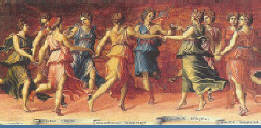Dream Moon
Dream Moon consists of eleven stanzas mostly of two quatrains each which are rhymed ACBD.
A lover thinks back to the time of his great love some distance in the past but which has
ended for some unexplained reason. He calls upon the moon to shine upon his sleeping figure
and to restore his happiness by conjuring dreams of former days.
Faded Away
A man (or woman) pines for his, now, deceased lover who has faded into an unknown world
beyond his reach. The storm tossed trees portray his turmoil at her loss but he yearns
for calm and the return of their days together regretting that the years have passed so
quickly. She remains firmly in his memory, however, as he muses on the nature of the
afterlife.
Format is seven stanzas each of two quatrains each rhymed AC, BD.
Fog
Two lovers form a passionate relationship which becomes overwhelmed as if by a fog swirling
over former thoughts of eternal loyalty that erases the vows previously sworn. They feel
the contrast of wintery cold entering their souls as a consequence of their deceit and
loss of companionship.
But far away in the hills of their minds is a plant that beckons them to resume their
relationship by means of clearing their minds of the fog and seeking clarity in a new
beginning. In admitting the sun into their lives, they will transform their fortunes and
drive out the doubts and hostility in order, once more, to find love as the binding force
in their lives.
Format is five stanzas of eleven to thirteen heavily but irregularly rhymed lines.
How Brief the Moon
The night gives way to glaring day as moon descends to recuperate in the care of a shielding
priestess. The lover regrets the loss of moonlight as the moon causes the tide to wash out
the hours as if his beloved had been carried away upon its departure. As day dims the
delights of night, he regrets her loss to the fates but retains the memories stored at
the place where he awaits the moon's return imagining its ascent when, even though he
may have died in her absence, his love would not have perished and he would be revived
by the moon bathing his grave and be able, once more, to feel their love in its beams.
Format is ten stanzas each of nine lines and is heavily rhymed throughout.
Memories
A tribute to memories which stay in the mind when all else has dissolved into the mists of
time. The incidents acquired in life can thereby be retained even when the events have
slipped into history as even the present passes away to be replaced by the new. They will,
however, suddenly be recalled as an unexpected event occurs to remind one of the beauties
that one has experienced.
Format is five stanzas each of ten lines rhymed HJ.
Memory
An ode to the memory of a lost lover.
Format is four stanzas each of twelve lines and all fulsomely rhymed.
No Return
No Commentary
The Day of Reckoning
A woman has voluntarily but inexplicably disappeared without trace or warning to the despair
of her grieving lover. He expresses his fury and despair to her upon her suddden reappearance
but concludes that he could not bear a repetition and casts her out.
Format is five stanzas each of nine lines none of which are rhymed.
The Land I Knew
A man feels the onset of death when winter yields to a permanent spring and he retains the
sight of the beauty he knew. His river has run through the course of his life as far as the
sea. Now, he ascends the path to the skies aided by the moon dispelling his fears. With a
new found freedom, he will proceed to repeat his earthly success that will act as guidance
to others in their lives. As he nears the end of his final journey, he rejoices at the
everlasting day before him and visualises an existence after death not distant from his
beloved.
Format is nine stanzas, mostly of twelve lines each, fulsomely rhymed throughout.
The Last Smile
A bereaved lover compares his loss to the change of season into Autumn and Winter. All of
nature has lost the charm of Spring and Summer: leaves dropping; the year closing; flowers
falling to the earth. Time passes and life declines but, even in bereavement, he can still
recall the words and sounds of a life now passed. Love lives on beyond the grave as he
seeks remembrance in the stars shining through the, now, leafless branches.
Format is ten stanzas each consisting of two quatrains all of which are rhymed AC, BD.
Too Proud to Return
Too Proud to Return consists of seven stanzas each of six lines and is not rhymed.
Two lovers have a bitter disagreement leading to separation but, unable to discard their
pride, neither will admit to any fault. It is as if they were separated by a wide river
mouth with each on opposite headlands. The protagonist has not stopped loving but
suppresses any admission of wrongdoing despite the pangs of separation.
He is aware that their love still burns as brightly as before but he is resolute in
stubbornly refusing to admit his faults. Their separation will pertain even unto the grave
and neither party will be prepared to re-examine their flaws. They will, instead, drag out
their days regardless how crippled their minds become.
|
